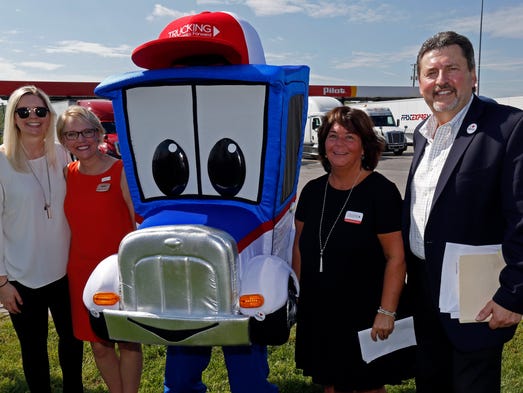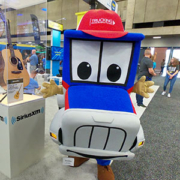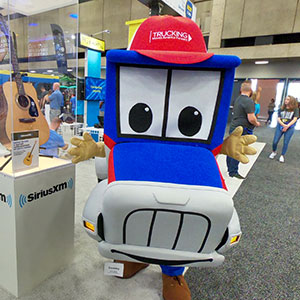Working in the family moving business, Adam Lowy watched relocating homeowners trash tons of food upon arrival of the truck scheduled to haul all belongings.
Appalled by the waste, Lowy established Move For Hunger, a non-profit that has organized moving van drivers to collect food that homeowners would throw out rather than pack.
“This is such a simple idea, but one we missed for years,” said Bill Paxton, chief operating officer of Paxton Van Lines Inc. of Springfield, Va.
“This is a win for us to be a part of the effort to fight hunger and it’s a win for food banks, the hungry and the homeless because our trucks can collect and drop off the food to them,” Paxton said.
Nearly 40 percent of all food waste in the U.S. ends up in landfills, according to the U.S. Department of Agriculture. The USDA’s Economic Research Service reported in 2015 that more than 48 million people in the U.S., including 15 million children, are living in food insecure households, meaning they don’t have access to sufficient nutritious meals.
Move For Hunger helped feed more than 1 million people last year, said Lowy, who quit his job at Lowy’s Moving Service, the Neptune, N.J. business owned by his father and two uncles, to launch the non-profit in 2009.
“I saw an opportunity to be able to salvage this food that would just be going to waste,” Lowy told Trucks.com. “We immediately got an incredible response and in the first month we collected about 300 pounds of food. It has just grown from there.”
While food banks typically receive donations at holidays, the food collected by the moving van companies comes in year round, especially in the summer when residential relocations peak. Food banks need supplies during the summer months when children, who may rely on food assistance programs for nutritious meals at school, are out of session and may go without food, Lowy said.
Move For Hunger provides its relocation company partners with cardboard boxes for moving customers to stock with non-perishable packaged and canned goods. The moving companies deliver the boxes to local food banks.
That network has expanded to include around 750 moving companies in North America. The organization has donated more than 7 million pounds of food to food banks since its founding in 2009.
Customers interested in finding a moving company that participates in the Move For Hunger program can type in their ZIP code on the organization’s website, which then shows them the closest moving partners in their areas.
The non-profit relies on moving companies and the trucking industry for donations. It is currently raffling a $90,000 2018 Freightliner straight truck as part of its “Big Truckin’ Raffle” to aid its food relief efforts. The raffle is open to the public and tickets are available for $500 each.
So far, more than 100 of the 500 tickets have been sold, Lowy said.
Move For Hunger also supports charitable races, where entry fees include food donations, food drives and other events throughout the year. The organization also works with a network of realtors across the country who talk to potential clients about Move For Hunger’s work.
Its moving company partners said it’s a morale booster for employees, who pick up and drop off the food donations, and organize other events throughout the year.
“Our agents have found it to be an extremely rewarding program to be able to help hungry families in their communities,” said Katie Gross, an Atlas Van Lines spokeswoman. Atlas is Move For Hunger’s largest moving company partner.
About a third of the moving companies affiliates agents participate in the Move For Hunger program, Gross said. Its agents have donated more than 1 million pounds of food in the past five years.
One Move For Hunger partner, Firefighting’s Finest Moving & Storage Inc. of Fort Worth, Texas, has collected more than 67,000 pounds of food, equivalent to 55,800 nutritious meals, for the Tarrant Area Food Bank, or TAFB.
“This is just part of what we do now,” said David Peterson, senior moving consultant and community outreach coordinator for Firefighting’s Finest.
The company also donates the use of its trucks throughout the year to pick and deliver food items to TAFB for companies, schools or churches that have food drives, but have no way to transport what they collected.
Firefighting’s Finest and Move For Hunger help struggling families in the Fort Worth area, said Anita Foster, a TAFB spokeswoman.
“Our mission is to make sure nobody has to go hungry,” Foster told Trucks.com. “For families who have fallen on hard times, we don’t want them to have to decide whether to pay their light bill, day care or eat. Move For Hunger helps us provide the basic human need to have enough food to eat.”
TAFB provides 500,000 meals to hungry area residents every week, she said.
Lowy said he is always looking for new programs to support Move For Hunger’s mission to reduce food waste and feed the hungry. Recently, the organization has started a program where college students who are moving out of their dorms or apartments for the summer can donate food that might otherwise be thrown away.
“I am excited to continue the work we started,” Lowy said. “The transportation industry has really gotten behind us and we are really making a difference in the lives of people every day.”
Link: Trucks.com














